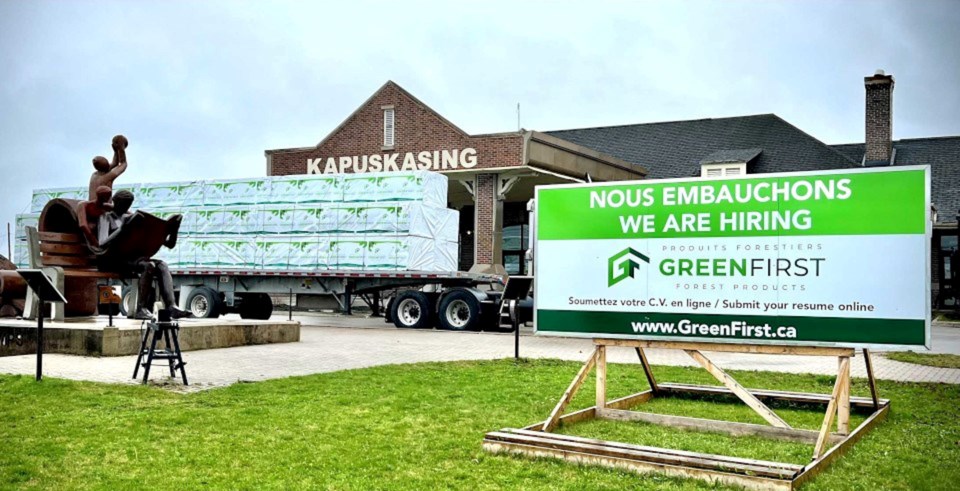The closure of two forest products mills in Espanola and Terrace Bay has spooked Kapuskasing residents about the future of its paper mill, an industrial cornerstone in town for more than a century.
The negative chatter around town had reached a point where Mayor Dave Plourde felt he had to quell fears about the longevity of the last paper plant in northeastern Ontario.
It’s why he and Hearst Mayor Roger Sigouin issued a news release this week trying to allay residents’ concerns after a meeting with Terry Skiffington, the head of Kapuskasing Paper, and touring the facility.
“It’s just to ensure no panic; everything’s going well,” said Plourde of the release.
“There are plans for the future and the viability of the mill,” he said. “We’re working together to ensure its future.”
Long-term, things are trending in the right direction, he said.
A recently tabled consultant’s report headlines that Kapuskasing’s population base will grow between 2024 and 2051 related to opening new mines in the northeast and all the business spinoffs that will come with it.
In that span, Kapuskasing’s employment base is estimated to jump from 4,010 jobs to 4,650.
Plourde said local concerns about the newsprint mill in an increasing digital age is nothing new.
“Ever since I’ve been here,” he said, reflecting on his 30-year career on council, “there’s been talk around survival and the last man standing. Well, we’re it.”
Should parent company GreenFirst Forest Products' plans for the Kapuskasing paper plant come to fruition, the mill and town “will have a bright future,” said Plourde.
“The plans they have for the facility are really interesting,” said Plourde, who declined to get into the specifics of their discussion with the company, nor their plans.
Skiffington, who was appointed head of GreenFirst Forest Products' paper business in January, was not available for comment.
In early 2022, the company pocketed $1.2 million in provincial funding to restart a paper line to manufacture an eco-friendly paper product and create 45 new jobs.
“I think they have plans around that,” said Plourde.
The paper mill has been the focus of a “turnaround” effort, according to the company.
They’ve acknowledged the Kapuskasing paper mill “faces many headwinds” related to pricing pressures, the decline in use of its paper products, and with wood chip supply issues.
In its 2023 third quarter results, through to the end of last September, the paper business posted an operating income of $1.8 million compared to an operating loss of $11.6 million in the prior year’s three quarters.
The company is looking to the restart and gains in efficiency of a second paper machine to inspire better results, along with establishing the paper mill assets as a stand-alone business, separate from the lumber side, to reduce costs and provide for better decision-making.
But beyond the mill’s prospects, Plourde is encouraged by Kapuskasing’s future direction.
Kapuskasing’s fortunes have rebounded in recent years, according to a consultant’s report tabled by council. Growth will continue based on what’s happening in the natural resources industries and its workforce needs, and other factors.
The town’s population was on the wane from 2006 to 2021. Things have reversed course since the end of the pandemic. The consultants say Kapuskasing’s population has increased from 8,290 in 2021 to an estimated 8,400.
The Watson & Associates report forecasts the town is in store for a population surge over the next three decades, growing from 8,400 in 2024 to 9,250 by 2051.
Plourde agrees. Since COVID, Kapuskasing is seeing an influx of new arrivals, with a large international student population (at the Université de Hearst’s Kapuskasing campus) with many new arrivals being french-speaking African newcomers to a community that’s 70 per cent bilingual.
Mining is going strong in the area, said Plourde, and many residents are doing the long commute to the Detour Mine, northeast of Cochrane, and other remote operations.
And there’s the potential for more mines on the horizon.
The possibility of the Canada Nickel open-pit project, south of Smooth Rock Falls, going into construction and production at some point will draw people to the area.
But there’s already a housing crunch in town, said Plourde. The report indicates a total of 525 new units will needed by 2051.
“The fact that Kapuskasing serves as a hub for the whole region along Highway 11 puts us in a unique situation,” said Plourde. "We’re going to have to build houses.”
Historically, in Northern Ontario mining and mill towns, industry built housing for its workers. Kapuskasing, originally designed to host 14,000 people, always had a large inventory of affordably priced homes, said Plourde.
“That’s all gone now. It’s eaten up. We have nothing available,” said Plourde. “You can’t find a home or an apartment.”
Plourde said Kap Paper has hired workers from Terrace Bay and Espanola, but has expressed to the Town that it needs more housing to attract people to the community.
Local housing growth has picked up, with an average of 19 units annually from 2018 to 2022, but Plourde said they have to pick up the pace.
They’ll need a mix of new housing stock to upgrade its 1970s and 1980s-era inventory, along with more seniors' and extended care facilities to free up more houses and apartments in the market.
To initiate those housing projects, Plourde said they’re looking to tap into the next round of the Building Faster Fund when the province opens up applications for small municipalities.
The Town’s ongoing discussions with Kap Paper not only keeps the town in the loop on the company’s plans, said Plourde, but also affords an opportunity to work hand in hand to solve their housing shortage. GreenFirst is also a manufacturer of dimensional lumber, he said.
And since they are Kapuskasing’s industrial anchor and main employer, better relations mean the municipality is more of a willing advocate to lobby government on their behalf, Plourde said.
“We’ll be there for them 100 per cent.”




